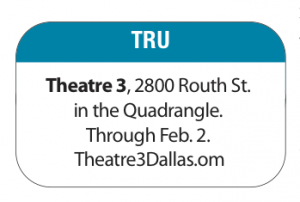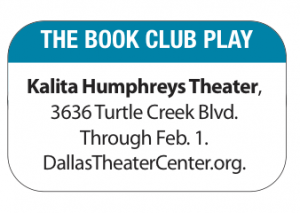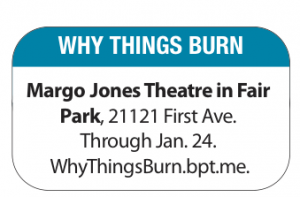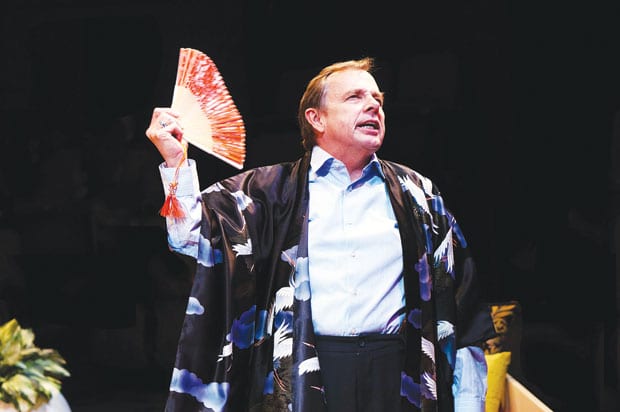Capote comes into focus in ‘Tru;’ trashy ‘Book Club’ opines on litter-ature
ARNOLD WAYNE JONES | Executive Editor
I’m not sure gay culture as we have come to know it would have existed today without Truman Capote. Gays have long spoken in their own kind of code (“family,” “Friend of Dorothy,” “grrlll”), but Capote was such an inveterate magpie of language, and so relentless, even fearless, in revealing secrets, just appearing on a talk show with that high pitched whine of his and dishing about haute société (and the gays who fawned all over them) ripped off the mask to mainstream culture … or in Capote’s case, ripped off a Band-Aid.
That’s what happened when he published the first chapter of his proposed chef d’oeuvre, Answered Prayers, in which he mocked the very grandes dames who made him a must-know personality. He craved their acceptance and love, no matter what he said to the contrary. But he couldn’t help himself. “You’d have to be deluded to think a writer was not taking notes,” he says in Theatre 3’s presentation of the rarely-revived solo play Tru.
It’s Christmas Eve 1975, and Truman is alone in his fancy East Side apartment, drinking himself into a stupor since Babe Paley and Slim Keith turned their backs on him for making gossip into literature. He’s trying to justify his actions, but he keeps recalling how this is a cycle for him: He did the same when he was 8 years old, and hasn’t really learned any lessons since. How could he? A writer needs to write, and when you hang out with the elites, that’s what you know.
Tru isn’t the play I rem ember, in part because the original Broadway version was dominated by Robert Morse’s uncanny impersonation. It’s not as tight a narrative as it could be, though it does suggest persuasively the contradictions in Tru that made him a character for decades. (When was the last time an author was this kind of celebrity that didn’t write about vampires or wizards?)
ember, in part because the original Broadway version was dominated by Robert Morse’s uncanny impersonation. It’s not as tight a narrative as it could be, though it does suggest persuasively the contradictions in Tru that made him a character for decades. (When was the last time an author was this kind of celebrity that didn’t write about vampires or wizards?)
Jaston Williams tackles the role full-heartedly and unabashedly, and for nearly two hours, it’s just him, a bottle of Stoli, a kimono and Jay Presson Allen’s words that keep us rapt. Williams never gives up — or really tries to — his West Texas twang for Capote’s odd mix of Alabama drawl and pinched Northeastern ennui; there’s more than a little Arles Struvie in his Truman. Purists will rage about it, and they have a point. But this is about character more than the trapping, about the fragility of the human psyche as much as anything else. Truman is the vessel for this journey of understanding into the artist’s heart — warts and all.

SITCOM HELL | Closet cases and liberal guilt are just some of the many cliches that dominate the unfunny ‘Book Club Play.’ (Photo by Karen Almond)
Capote wrote literature. The Book Club Play is more like litter-ature. It’s a dreary, terrible title for a dreary, terrible play getting a miserably inept production right now at the Kalita Humphreys Theater. I’m almost at a loss to say more — the first rule of Book Club should be: Do not talk about Book Club — but feel I must, if only to caution the unwary travelers through North Texas theater away from what can only be called its Scylla and Charybdis.
First up: It’s barely a “play” at all, although on the surface it has the trappings: there are characters (two-dimensional stereotypes, each of them) and a plot (simultaneously predictable and tortured) and dialogue (stilted) and even jokes, some of which are funny (I counted four). But really it’s more of an idea for mischief making that feels entirely conceived inside the brain of a writer weaned on sitcoms who has herself never actually interacted with other members of the human race.
The six characters are members of a Middle-American-elite book club, led by Ana Smith (Christie Vela), a fluff-piece columnist for a local paper whose social-climbing snobbery makes Hyacinth Bucket seem modest. She leads a small klatch of friends who all read books for fun (“a good 16 months before Oprah did it,” Ana clucks) … only no one really is having fun. Ana insists they only consume the acknowledged classics of world literature — basically, only stuff by dead white European males. The others allow themselves to be cowed by Ana’s strong-arming because the social aspect of the book club means something to each. For her husband Robert (Jeffrey Schmidt), it’s a way to hang out and drink and eat and have friends over; for Will (Steven Walters), it is a chance to show off his liberal arts education; Jen (Sarah Rutan) finds it a release from her sexual obsession, and newcomer Lily (Tiana Kaye Johnson) welcomes the chance to meet new people in her new town.
Would that the play’s author, Karen Zacarias, have one iota the craft of the masters they indulge in. Ana and Will pat themselves on the back for getting authorly imagery and waxing enthusiastic about books, but their insights are no deeper than what they could glean from skimming a Cliffs’ Notes pamphlet without ever actually cracking the spine of one of the books themselves. The only one who seems to get this is Robert, a former jock who rarely reads the books and just enjoys partaking of the dip. Ana, however, is the opposite: a predictably stick-up-her-ass, bored housewife who thinks of herself as a cultural touchstone but who’s just as middlebrow and repressed as any character in a bad Danielle Steele novel, which is of course, any Danielle Steele novel. Ana insists on reading Ulysses over The Da Vinci Code, considers 400-plus page counts a mark of worth and eschews filmed adaptations of literature as corruption.
Their lives are thrown into turmoil when Ana agrees to allow a famous Danish filmmaker (never seen) — one known for planting cameras in the homes of his subjects to film them during their book club meetings — unobtrusively record their meetings, including all of the secret trysts and confessions that people would prefer to keep silent. But they forget the camera is there, meaning their private lives will soon be broadcast to the dozens of people who will turn out for a Danish filmmakers documentary about book clubs.
 And hence is one of the innumerable problems with this flaccid, infuriating play. Nothing in it — the characters, the situations, the understanding of anything in the culture today — rings as even remotely true. The documentary premise is a cheesy gimmick, and not even a very contemporary one (reality TV would have made much more sense, except that Ana probably wouldn’t have agreed to be on basic cable). The “surprising revelations” are neither surprising (secret crushes) or really revelations (closet case come out), and are painfully overacted with big gestures. Near the end, the lights go dark and when they come back up, the set is a melee with the actors awkwardly posed in “comical” but not minimally realist positions (chairs are upturned, but a stemmed wine glass in the center of the action remains untouched). Even the bar set undermines the characters: They are supposed to be pretentious snobs, but the liquor selection appears to be culled at the last second by what ever the property master happen to have in the trunk of his Hyundai: Lots of whiskey, but not one bottle of vodka, and anyway everyone drinks cheap grocery store sauvignon blanc? These are sophisticates? The costumes are atrocious, having the unmistakable air of being picked up at a Ross Dress for Less circa 1999.
And hence is one of the innumerable problems with this flaccid, infuriating play. Nothing in it — the characters, the situations, the understanding of anything in the culture today — rings as even remotely true. The documentary premise is a cheesy gimmick, and not even a very contemporary one (reality TV would have made much more sense, except that Ana probably wouldn’t have agreed to be on basic cable). The “surprising revelations” are neither surprising (secret crushes) or really revelations (closet case come out), and are painfully overacted with big gestures. Near the end, the lights go dark and when they come back up, the set is a melee with the actors awkwardly posed in “comical” but not minimally realist positions (chairs are upturned, but a stemmed wine glass in the center of the action remains untouched). Even the bar set undermines the characters: They are supposed to be pretentious snobs, but the liquor selection appears to be culled at the last second by what ever the property master happen to have in the trunk of his Hyundai: Lots of whiskey, but not one bottle of vodka, and anyway everyone drinks cheap grocery store sauvignon blanc? These are sophisticates? The costumes are atrocious, having the unmistakable air of being picked up at a Ross Dress for Less circa 1999.Zacarias shows a paltry understanding not just of literature and book clubs, but also homosexuality, married life, how long it takes to read a book, documentary filmmaking and even the act of writing itself. But why delve into the details when superficiality is so much easier and untaxing? If the playwright herself were half as interested in developing her own characters as they pretend to be in the books they read, this might have been something more than a low-rent sitcom pilot waiting to be picked up by the CW, or, in a pinch, TBS. As it stands, it’s merely one of those insufferable and infuriating pieces of garbage by hack playwrights who have somehow been christened with the mantle of artistic respectability, allowing them to infest regional theaters. Personally, I’d prefer to read The Da Vinci Code.
Why Things Burn in the tiny Margo Jones Theatre in Fair Park doesn’t have an iota of the budget DTC spent on their bad costumes, and there were technical glitches on opening weekend, but the first production from this new company led by producer-director Van Quattro (Superior Donuts) does a lot with the little. The play — virtually never produced outside workshops in Los Angeles, mostly decades ago — is a nifty little bit of film noir with a sick heart.

It’s the early 1950s, the brief interregnum between Nazis and the Cold War, right about when TV was driving folks indoors and away from the live entertainment of traveling circuses. One member of the side show, a German with painful memories of the war, dreams of establishing a new home in Hollywood.
If this sounds like the current American Horror Story: Freak Show arc, no kidding. There are definite similarities in plot, theme and character, though the particulars are quite different (the German here, for instance, is a man, played by Elias Taylorson). For one, most of the action takes place in Hollywood, with the dew-eyed starlet (Nikki Cloer) being preyed upon by a sleazy lesbian casting agent (Cindee Mayfield) … except that she seems to like it.
Despite a microbudget, the acting is very solid, with the actors going full-bore, from the hard-to-watch aftermath of swallowing of a razor blade to the sex scenes to the inventive way to use fire in space that can’t use fire. It’s a promising start for a new company.
This article appeared in the Dallas Voice print edition January 16, 2015.


